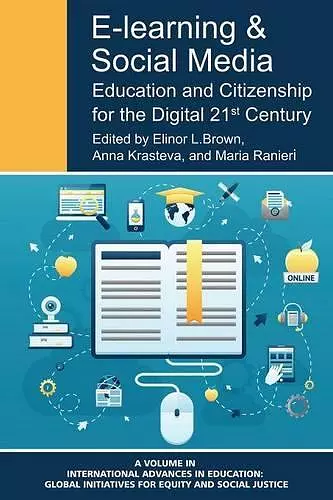E-Learning and Social Media
Education and Citizenship for the Digital 21st century
Anna Krasteva editor Elinor L Brown editor Maria Ranieri editor
Format:Paperback
Publisher:Information Age Publishing
Published:10th May '16
Currently unavailable, and unfortunately no date known when it will be back

International Advances in Education: Global Initiatives for Equity and Social Justice is an international research monograph series of scholarly works that focuses primarily on empowering children, adolescents, and young adults from diverse educational, socio-cultural, linguistic, religious, racial, ethnic, and socio-economic settings to become non-exploited/ non-exploitive contributing members of the global community. The series draws on the international community of investigators, academics, and community organizers that have contributed to the evidence base for developing sound educational policies, practices, and innovative programs to optimize the potential of all students. Each themed volume includes multi-disciplinary theory, research, and practice that provides an enriched understanding of the drivers of human potential via education to assist readers in exploring, adapting and replicating innovative strategies that enable ALL students to realize their full potential.
Among these strategies are the integration of digital technologies (DT) and information and communication technologies (ICT) into contemporary education platforms. However, technology must be more than just a tool to deliver content and stimulate engagement; it must become a means to broaden access to learning, advance equity, promote social justice, and encourage social inclusion. Especially reaching out to address the academic and social needs of rural, impoverished, marginalized, and displaced populations. Though the digital divide continues to hinder educational attainment for underprivileged populations, ICTs are providing significant opportunities to deliver literacy and basic skills instruction to disadvantaged segments of the global population as well as engage, motivate, and customize learning to address local needs. Nonetheless, the availability of ICT is not a deterministic process. Other societal, cultural, political and contextual factors are of fundamental importance to acceptance and integration that enables people to benefit from technology. The relationship between educational access, instructional delivery, and ICT should be considered in more complex terms. In particular, digital technologies should be viewed as instructional tools that improve access to educational opportunities, strengthen cultural resources, promote social and economic equity, and provide students with the knowledge and competencies to prepare them for a future that cannot be predicted. Therefore, developing ICT and media capabilities that instill citizenship and stewardship in today’s students is crucial to gleaning the social and the cultural advantages of a contemporary global society that encourages full and equal citizenship.
personality of children to the community...
ISBN: 9781681234281
Dimensions: unknown
Weight: unknown
386 pages